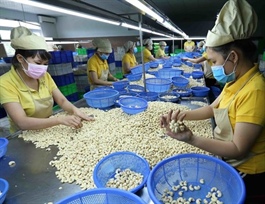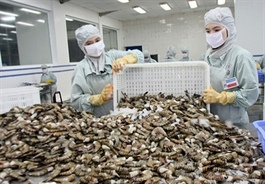Imports cheaper than Vietnamese fruits
Imports cheaper than Vietnamese fruits
Fruit imports to Vietnam are on sale not only at supermarkets but also at traditional wet markets and on roadside carts in Ho Chi Minh City thanks to their high quality, abundant supplies, and increasingly competitive prices compared with domestic products.

Not only fruits that Vietnam cannot plant, those that can be grown in Vietnam, such as durians, mangosteens, mangos, and pineapples, are being imported in high volumes.
Pham Thi Thuy Kieu, a resident in Ho Chi Minh City, decided to buy three kilograms of Gala apples imported from South Africa for VND159,000 (US$6.8) at Emart supermarket in Go Vap District, Ho Chi Minh City after mulling over choosing domestic or imported products.
At a Co.opXtra supermarket in Thu Duc City, Ho Chi Minh City, Egypt’s mandarins are priced at VND56,900 ($2.4) per kilogram, lower than the prices of mandarins from Dong Nai and Tien Giang Provinces in southern Vietnam, at VND65,500 ($2.8) per kilogram.
Many traders said that the prices of fruit imports, such as apples, pears, and grapes, have fallen 10-20 percent over last year and 30-35 percent over the previous two years.
Fruit imports have flooded traditional wet markets, such as Ba Chieu in Binh Thanh District, Tan Dinh and Da Kao in District 1, and along city streets.
These days, mangosteens and langsat from Thailand are more common than locally-grown products.
Local fruit stalls are also full of grapes and apples imported from the U.S..
Pham Van Hung, a fruit vendor on Le Quang Dinh Street in Binh Thanh District, said he started selling Thai pineapples after the Lunar New Year, or Tet holiday due in January, as they are sweeter and more scented than Vietnamese ones, so consumers prefer them to local pineapples despite the higher price.
“A kilogram of Thai pineapples is priced at VND30,000 [$1.3] and I can sell 40-50 portions per day,” Hung said.
Thailand is entering the durian and mangosteen harvest seasons, so the supplies are bountiful and the prices are competitive, said Ngo Tuong Vy, director of Chanh Thu Fruit Import-Export Group JSC in the Mekong Delta province of Ben Tre.
Meanwhile, Vietnam will harvest these kinds of fruits in the next 1.5 months, so the current supplies are small and the prices are high.
The prices of fruit imports have been falling with some kinds seeing their prices halved from the levels in previous years, according to Dang Phuc Nguyen, general secretary of the Vietnam Fruit and Vegetable Association.
“With many agreements, most of the fruits that other countries export to Vietnam are not taxed, including countries with large supplies of fruits, such as New Zealand, Australia, and the U.S., resulting in plunging prices,” Nguyen said.
The prices of fruit imports are competitive as more enterprises import and distribute the products given simple import procedures, said Nguyen Dinh Tung, general director of Vina T&T Import Export Trading Service Co. Ltd. in Ho Chi Minh City.
The trend will continue, leading to a further decrease in the prices of fruit imports, Tung affirmed.


























